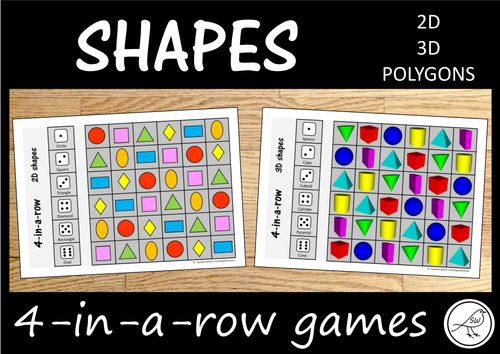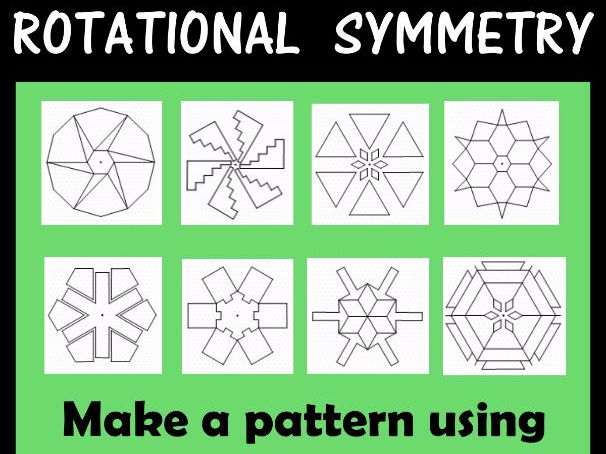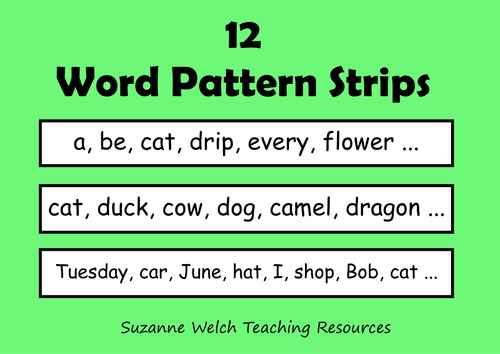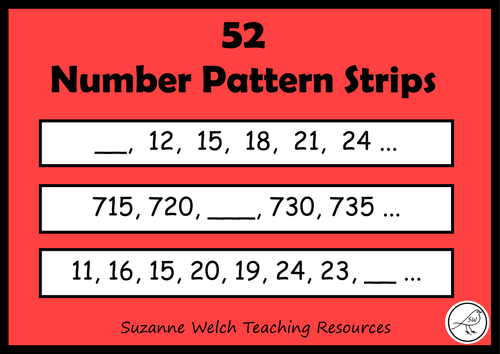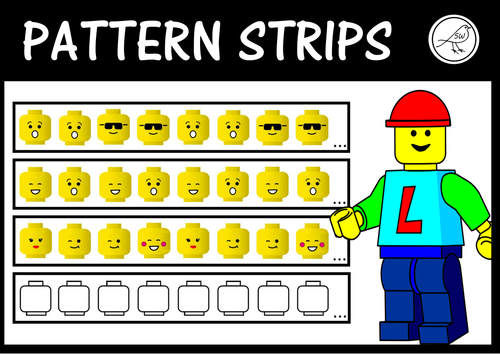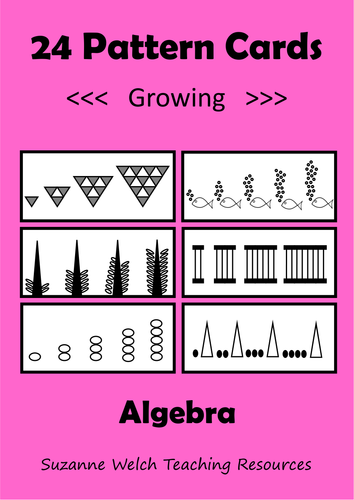
377Uploads
162k+Views
10k+Downloads
Math for early childhood

SHAPES GAME - 2D, 3D and Polygons. 4-in-a-row gameboards.
Gameboards to support the learning of 2D, 3D and Polygon shapes.
Provided in both COLOUR and BLACK AND WHITE.
2D SHAPES:
Game 1 - circle, square, triangle, diamond, rectangle, oval.
Game 2 - star, trapezoid, heart, parallelogram, cross, crescent.
3D SHAPES:
cone, cube, sphere, cylinder, pyramid, cuboid.
Also included is a gameboard where the word 'cuboid' is replaced with 'rectangular prism'.
REGULAR POLYGONS:
pentagon, hexagon, heptagon, octagon, nonagon, decagon.
** 4 gameboards in total (plus extra 3D shapes one with the alternate word).
HOW TO PLAY:
Roll the dice, read the word, find the picture and put a counter on it. The first person to get 4 of their counters in a row is the winner.
EQUIPMENT NEEDED:
one dice (numbered 1-6) and counters for each player.
NUMBER OF PLAYERS:
works best with 2 players.
© Suzanne Welch Teaching Resources

Rotational Symmetry – Art activity – Maths (Geometry)
Rotational Symmetry Art Activity.
This fun activity produces fantastic designs that your students will be super proud of.
Each template has rotational symmetry of order 6 and is on isometric dot paper. Your students simply add more lines (ensuring each line is done 6 times to keep it symmetrical), using the dots to maintain accuracy. When your students are happy with their final design they can colour it in using symmetrical colouring.
Afterwards, your students may wish to cut their design out and use it in another piece of artwork. For example, adding a stem and leaves to turn it into a flower.
Plain isometric dot paper has also been provided as a basis for your students to create their own rotational symmetry design from scratch.
Provided as two separate files – A4 paper size and Letter paper size.
What you get:
• 30 templates on isometric dot paper
• Poster explaining rotational symmetry
• Isometric dot paper (plain)
• Teacher notes
© Suzanne Welch Teaching Resources

Math Pattern Strips (Algebra) - word and letter patterns
A fun set of word pattern strips. Use as a literacy task or make it part of your algebra unit when looking at patterns in math.
This resource contains
12 x Strips to identify the pattern and continue it.
12 x Strips to find the missing word
Pattern reference (teacher guide)
Student recording sheet and teacher answer sheet (for the ‘find the missing word’ strips)
A blank template for students to make up their own word patterns.
The set of word pattern strips are provided in 2 different formats. Simply print the format you want to use. For example:
• Cat, duck, cow, dog, camel, dragon…
• Cat, duck, ___, dog, camel, dragon …
So there are 12 different patterns and 24 different strips.
There are many different possible answers for all of the word patterns in this resource, but the answer must follow the ‘rule’. For example, in the list above, any animal that begins with the letter ‘c’ would fit in the gap.
© Suzanne Welch Teaching Resources

Math Pattern Strips (Algebra) - Numbers
A comprehensive pack of number pattern strips. Everything you need for a differentiated math lesson.
Numbers under 100
20 x Strips to identify the pattern and continue it.
20 x Strips to find the missing number.
Pattern reference (teacher guide)
Student recording sheet and teacher answer sheet (for the ‘find the missing number’ strips)
Numbers over 100
20 x Strips to identify the pattern and continue it.
20 x Strips to find the missing number.
Pattern reference (teacher guide)
Student recording sheet and teacher answer sheet (for the ‘find the missing number’ strips)
More challenging
12 x Strips to identify the pattern and continue it.
12 x Strips to find the missing number.
Pattern reference (teacher guide)
Student recording sheet and teacher answer sheet (for the ‘find the missing number’ strips)
All pattern strips contain increasing and decreasing number patterns.
The sets of number pattern strips are provided in 2 different formats. Simply print the format you want to use. For example:
• 22, 24, 26, 28, 30, 32, 34 …
• 22, 24, 26, 28, __, 32, 34 …
There are 104 number strips in total. There are 52 different number pattern sequences.
The ‘more challenging’ strips have number patterns such as:
90, 80, 81, 71, 72, 62, 63, 53 … (subtract 10 then add 1)
© Suzanne Welch Teaching Resources

Pattern Strips for Maths - toy heads
12 fun pattern strips that can be used during an algebra unit in math. Includes all of the resources that you will need for an engaging lesson. Simply print and you’re ready to go!
This resource includes:
• 12 pattern strips
• Pattern reference (ABCD pattern guide)
• Task card – “Can you identify the pattern and continue it?”
• 12 toy heads (6 on a page. Use these as support materials)
• Recording sheet – students identify the sequence and record the next head.
• Recording sheet – students identify the sequence and record the next 4 heads.
• Answer sheets for both recording sheets.
• Toy head strip template - students can make up their own sequences.
• Plain strip template
The patterns are:
AB, ABC, ABCD, ABBC, AAB, ABB, ABBCC, AABC, ABCB, ABCC, AABB, ABBA.
© Suzanne Welch Teaching Resources

Math Pattern Cards (Algebra) - growing/extending patterns
A set of 24 ‘growing’ or ‘extending’ pattern cards for use in Algebra math lessons.
Print friendly – black and white.
This resource contains:
24 growing pattern cards (3 different formats – see below)
Student recording sheet
Answer sheet – for the cards with a missing pattern in the sequence.
The set of growing pattern cards are provided in 3 different formats. Simply print the format you want to use.
• Identify the missing pattern in the sequence and record it on the sheet provided (cards are numbered 1-24).
• Identify the growing pattern and draw the next one in the sequence (cards are numbered 1-24)
• Identify the growing pattern and draw the next one in the sequence (cards are not numbered, allowing you more freedom in their use)
© Suzanne Welch Teaching Resources

